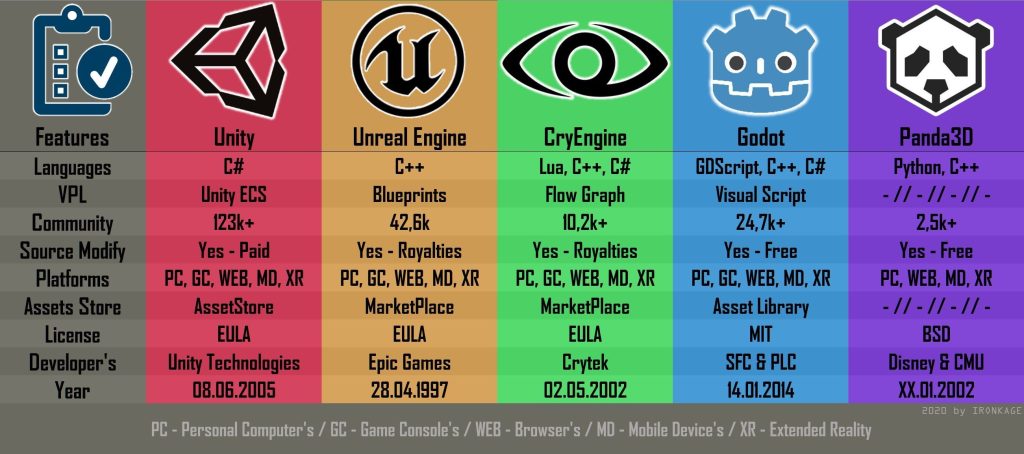
Game development has come a long way over the years, thanks to the continuous evolution of game engines. These powerful software frameworks serve as the foundation for creating interactive and immersive digital experiences. The two most prominent players in the game engine market are Unity and Unreal Engine. In this article, we will explore the evolution of these game engines and compare their features, capabilities, and suitability for different types of projects.
The Rise of Unity
Unity, developed by Unity Technologies, first emerged in 2005, aiming to democratize game development and make it accessible to anyone, regardless of their technical expertise. Its user-friendly interface and drag-and-drop functionality revolutionized the industry, attracting both aspiring indie developers and established studios. Unity’s early versions were primarily used for mobile game development due to its focus on simplicity and low hardware requirements.
Over the years, Unity has evolved significantly, incorporating advanced features and expanding its target platforms. It now supports not only mobile devices but also PCs, consoles, and even augmented reality (AR) and virtual reality (VR) headsets. With Unity, developers can create games, interactive simulations, architectural visualizations, and various other applications.
The Powerhouse: Unreal Engine
Developed by Epic Games, Unreal Engine has a longer history, with the first version being released in 1998. Initially intended for first-person shooter games, Unreal Engine quickly gained popularity for its cutting-edge graphics and robust physics simulation. Its ability to create visually stunning and realistic environments made it a favorite among high-end game developers and major studios.
Unreal Engine’s development environment, called Unreal Editor, provides an extensive set of tools for creating complex game worlds. It offers a powerful scripting language, Blueprint, which allows developers to visually design gameplay mechanics even without programming knowledge. While Unreal Engine’s learning curve may be steeper compared to Unity, it offers unmatched flexibility and enables developers to push the boundaries of game design.
Feature Comparison
Both Unity and Unreal Engine have their strengths and weaknesses, making them suitable for different types of projects. Let’s take a closer look at some key features of these game engines:
Graphics and Visuals:
Unreal Engine has long been known for its exceptional graphics quality and photorealism. Its advanced rendering capabilities, including real-time ray tracing, make it the go-to choice for developers aiming for top-notch visuals. Unity, on the other hand, offers a more lightweight rendering pipeline, making it highly efficient even on lower-end devices. Unity’s graphical capabilities have significantly improved over the years, and it is now capable of delivering stunning visuals as well.
Scripting and Programming:
Unity employs C# as its primary programming language, which is known for its simplicity and ease of use. This makes it an excellent choice for beginners and those with limited coding experience. Unreal Engine, on the other hand, uses C++ for programming, which offers greater performance and control but comes with a steeper learning curve. Unreal Engine also provides visual scripting through Blueprint, allowing less technical users to create complex gameplay mechanics.
Community and Ecosystem:
Unity has a massive and vibrant community of developers, which has played a significant role in its growth and continuous improvement. It offers a vast marketplace with thousands of ready-to-use assets and plugins, allowing developers to quickly enhance their games. Unreal Engine also has a strong community, although not quite as large as Unity’s. However, it makes up for it with its high-quality asset store and regular Epic Games-sponsored contests and events.
Platform Support:
Unity initially gained popularity for its ability to develop games for mobile devices. It still excels in this area, supporting various platforms, including iOS and Android, out of the box. However, Unity has expanded its reach and now supports PC, consoles, VR, AR, and even web platforms. Similarly, Unreal Engine also supports a wide range of platforms, making it a suitable choice for cross-platform development.
The Final Verdict
Choosing between Unity and Unreal Engine ultimately depends on the project requirements and the developer’s preference. Unity shines in its simplicity, accessibility, and performance on lower-end devices, while Unreal Engine offers unparalleled graphical fidelity and control over game mechanics. Both engines have their loyal communities and are continually pushing the boundaries of what’s possible in game development.
As game engines continue to evolve, new players may enter the market, offering exciting alternatives. However, for now, Unity and Unreal Engine remain the industry leaders and continue to shape the future of game development.


